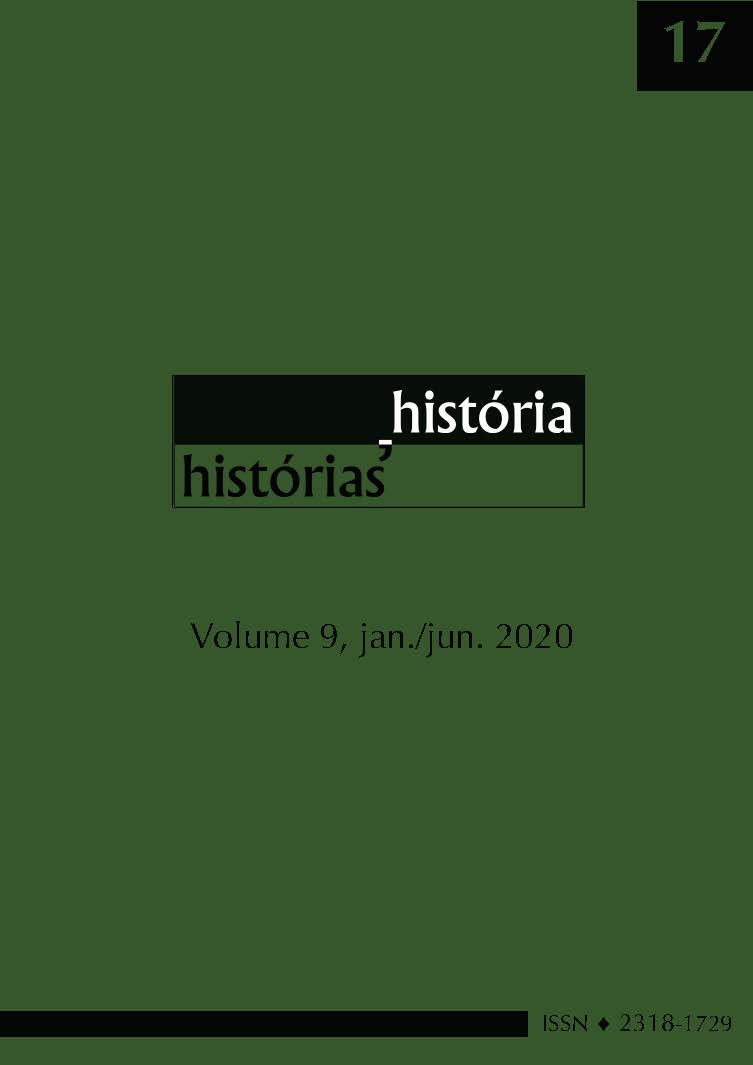"I AM NOT GUILTY, TO ENJOY DRINKING AND LIVING IN THE DAWN"
DORA LOPES, LOVE AND BOHEMIA IN SAMBAS SONG (1950-1962).
DOI:
https://doi.org/10.26512/rhh.v9i17.31821Keywords:
Keywords: Sambas Song; Gender Technologies; Loving and Sexual Device.Abstract
When we talk about bohemia, it is often associated with men and hardly imagines women being part of it. But the world of bohemia was also experienced by women, especially those who lived in it, such as, professional singers and actresses of the theater. Within this group we also included women composers who faced various prejudices to establish themselves in a musical scenario still closed to them. Our article aims to analyze the world that permeates the song sambas and sambas, specifically those of composition of singer Dora Lopes, between 1950 and 1962, which showed her relationship with the bohemian world, analyzing the representations of love and love/sexual relationships that the lyrics of her songs presented, using Teresa de Lauretis' gender studies and Tania Navarro Swain's notion of a love/sexual device to understand how Dora Lopes' compositions broke with the logic of a dominant love/sexual relationship model in this musical scenario.
Keywords: Sambas Song; Gender Technologies; Loving and Sexual Device.
Downloads
References
BAIA, Silvano Fernandes. A Música Popular na Historiografia: Reflexões Sobre Fontes e Métodos. Revista ArtCultura, Uberlândia, v. 14, nº 24, jan-jun 2012, p. 61-80.
BAUMAN, Zygmunt. Amor Líquido: Sobre a Fragilidade dos Laços Humanos. Rio de Janeiro: Zahar, 2004.
BRAH, Avtar. “Diferença, Diversidade, Diferenciação”. Cadernos Pagu (26), Janeiro-Junho de 2006, p. 329-376.
CASTRO, Ruy. A Noite do Meu Bem: A História e as Histórias do Samba Canção. São Paulo: Companhia das Letras, 2015.
DEL PRIORI, Mary. História do Amor no Brasil. São Paulo: Contexto, 2006DINIZ, Edinha. Chiquinha Gonzaga. São Paulo: Moderna, 2001.
FIGUEIREDO JÚNIOR, Paulo Matias de; e FARIA JUNIOR, Vitor Celso Melo de. “O primeiro amor não morre: apontamentos sobre a reconfiguração das fotonovelas na atualidade a partir dos Tableaux Vivants e dos Memes”. IN: Revista Temática, Ano XIV, n. 7. Julho/2018. NAMID/UFPB - http://periodicos.ufpb.br/ojs2/index.php/tematica. Acesso em 11/05/2020.
LAGARDE, Marcela. Claves Feministas Para la Negociacion em el Amor. Managua: Puntus de Encuentro, 2001, p. 31LAURETIS, Teresa de. “A Tecnologia de Gênero”. 1994 http://marcoaureliosc.com.br/cineantropo/lauretis.pdf
MATOS, Maria Izilda Santos de. Âncora de Emoções: Corpos, Subjetividades e Sensibilidades. Bauru: EDUSC, 2005MURGEL, Ana Carolina A. T. Mulheres compositoras no Brasil dos séculos XIX e XX. Revista do Centro de Pesquisa e Formação, nº 3, novembro de 2016.
MADUREIRA, Sevy. Bairro do Recife: A Revitalização e o Porto Seguro da Boemia. Recife: SEPLAN, 1996.
NAPOLITANO, Marcos. História & música: história cultural da música popular. 2.ed. revisada pelo autor. Belo Horizonte: Autêntica, 2005. (História & ... Reflexões).
NASCIMENTO, Uelba Alexandre do. “Boemia, Aqui Me Tens de Regresso”: Mundo Boêmio e Sensibilidades na MPB (1940-1950). Tese (Doutorado em História do Brasil), Programa de Pós Graduação em História, Universidade Federal de Pernambuco, Recife, 2014.
OLIVEIRA, Susane Rodrigues de. “A Violência do Dispositivo Amoroso e Assujeitamento das Mulheres nos Livros Didáticos de História”. Revista Labrys Estudos Feministas, julho/2016-junho2017, p. 08.
PARANHOS, Adalberto de Paula. Os Desafinados: Sambas e Bambas no Estado Novo. Tese (Doutorado em História Social), Programa de Pós Graduação em História Social, Pontifícia Universidade Católica, São Paulo, 2005.
RODRIGUES FILHO, Lupicínio. Foi Assim: O Cronista Lupicínio Rodrigues Conta as Histórias das suas Músicas. Porto Alegre: L&PM, 1995RIBEIRO, Pery. Minhas Duas Estrelas: Uma Vida com Meus Pais Dalva de Oliveira e Herivelto Martins. São Paulo: Globo, 2009RUIZ, Roberto. Araci Cortes: Linda Flor. Rio de Janeiro: FUNARTE, 1984.
SEIGEL, Jerrold. Paris Boêmia: Cultura, Política e os Limites da Vida Burguesa (1830-1930). Porto Alegre, L&PM, 1992.
TELES, Fídias. Os Malabaristas da Vida: Um Estudo Antropológico da Boemia. Recife: Comunicarte, 1989.
VELLOSO, Mônica. Mário Lago: Boemia e Política. Rio de janeiro: FGV, 2008.
Downloads
Published
How to Cite
Issue
Section
License
Copyright (c) 2021 História, histórias

This work is licensed under a Creative Commons Attribution-NonCommercial-NoDerivatives 4.0 International License.
Authors who submit papers with this journal agree to the following terms:
a) Authors retain copyright and grant the journal right of first publication with the work simultaneously licensed under a Creative Commons Attribution License that allows others to share the work with an acknowledgement of the work's authorship and initial publication in this journal.
b) Authors are able to enter into separate, additional contractual arrangements for the non-exclusive distribution of the journal's published version of the work (e.g., post it to an institutional repository or publish it in a book), with an acknowledgement of its initial publication in this journal.
c) Authors are permitted and encouraged to post their work online (e.g., in institutional repositories or on their website) prior to and during the submission process, as it can lead to productive exchanges, as well as earlier and greater citation of published work.




